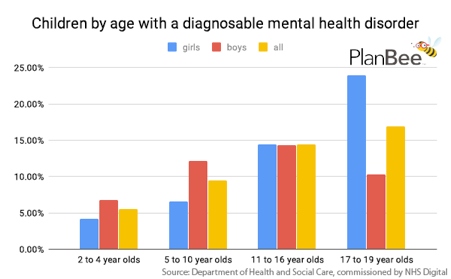Mental Health Awareness Week: mental health disorders in children continue to rise
Date published: 17 May 2019

The number of children with mental health disorders continues to rise
Mental Health Awareness Week is a fitting moment to examine the incidence of mental health disorders among children.
Perhaps unsurprisingly, the number of children with mental health disorders continues to rise - in a typical primary school classroom, 6.6% of girls and 12.2% of boys will have at least one diagnosable mental health disorder.
The numbers of children suffering with their mental health varies depending on their location and their family's income, with children from low-income families more likely to experience poor mental health than their peers from wealthier homes.
Data on mental health was collected by the NHS in 1999, 2004 and 2017.
The NHS found that high self-esteem was five times more common in young people without a disorder than in those with a disorder: self-esteem is closely linked to anxiety and poor body image.
Perhaps most worryingly, 20.7% of children who needed help with their mental health had to wait more than six months to see a mental health specialist.
In its January 2019 report, the government identified the role educators have to play in promoting mental wellbeing.
To help teachers, lesson planning experts Plan Bee have come up with 10 ways to create mentally healthy schools.
Parents may want to identify how many of these techniques are being used in your child’s school:
- Create a nurturing environment where everyone feels valued and safe.
- Allow everyone to have a voice.
- Be playful and have fun.
- Name feelings and emotions as they arise.
- Take a mood register, either verbally or as a self-registration board, to check in with the feelings in the room.
- Create an atmosphere where all feelings are allowed.
- Mentally healthy schools help children focus on the bigger picture.
- Take learning outside and make it active as much as possible.
- Read stories.
- Encourage calm classrooms.
Do you have a story for us?
Let us know by emailing news@rochdaleonline.co.uk
All contact will be treated in confidence.
Most Viewed News Stories
- 1Newhey's Char Steakhouse and Bank Chamber close with immediate effect
- 2Six men arrested in Rochdale child exploitation investigation
- 3Royton haulage firm fined after Rochdale dad went to work and didn’t come home
- 4Two men arrested after police chase ends up in Middleton river
- 5Obituary: Jean Ashworth
To contact the Rochdale Online news desk, email news@rochdaleonline.co.uk or visit our news submission page.
To get the latest news on your desktop or mobile, follow Rochdale Online on Twitter and Facebook.


